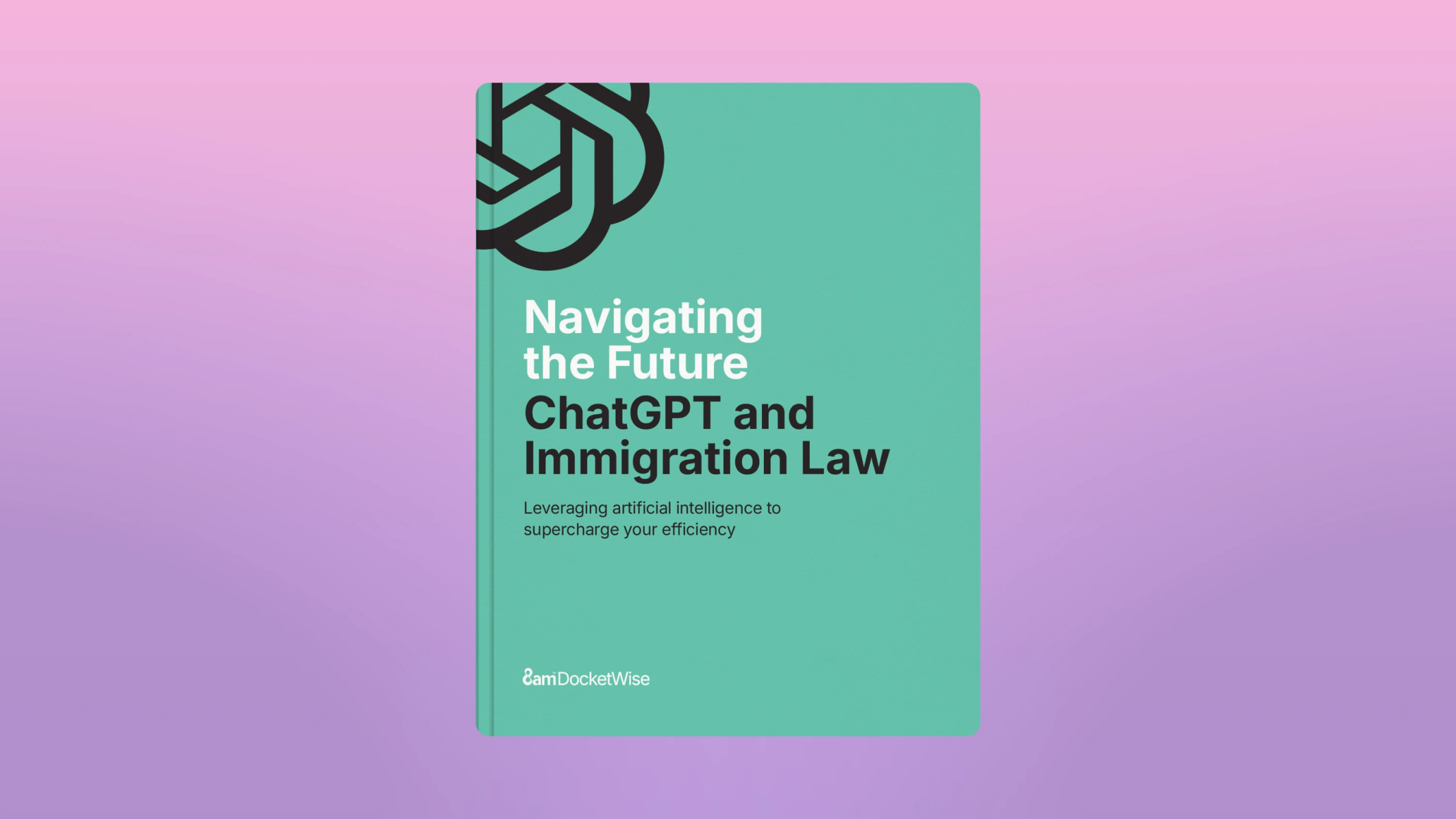Immigration law is a multidimensional discipline. Sometimes it’s straightforward, like an application for permanent residency or citizenship for a client. Other times, immigration law may intersect with other areas of law, such as criminal law, ethics violations, and federal litigation and more.
In this article, we’ve shared some of the essential immigration law books and reference materials for immigration lawyers of all stripes should have at their disposal, either in print or digitally. If you’re an immigration lawyer or work at an immigration law firm, which of these do you have at your firm? Which are you missing?
Top reference resources for immigration lawyers
Immigration law breaks down into multiple sub-specialties, including employment-based and family-based immigration, “crimmigration” removal defense, investment-based immigration, asylum and refugee law, and more. The reference sources below may not cover every area of immigration practice, but they are some of the top books, materials, and reference sources we’ve come across both from first-hand experience and from our law firm users that are considered to be fundamental for almost all immigration law practitioners. Let’s dive in.
Kurzban’s Immigration Law Sourcebook: an introductory reference text
Kurzban’s Immigration Law Sourcebook is a two-volume publication covering changes in immigration law, regulation, policies, and practices. Compiled by renowned immigration lawyer Ira Kurzban and currently in its 18th edition, Kurzban’s Immigration Law Sourcebook is a go-to reference source for immigration lawyers in all areas, thanks to its concise analysis of immigration law and regulations. If you need a quick answer to a question concerning applicable immigration law, this sourcebook will likely have an answer that can help. Over its eighteen editions, Kurzban has focused on giving perspective on how immigration law has evolved, with each edition including the latest regulatory changes.
The 18th edition focuses on some of the changes introduced and removed during the COVID-19 pandemic, details on premium processing, more specific definitions concerning DACA, Supreme Court decisions from the 2021-2022 term, changes to the T visa category, new regulations regarding public charge rules, and more.
For an overview of the sourcebook's contents from the source itself, check out this short insight into the 18th edition of Kurzban’s sourcebook from Ira Kurzban himself.
AILA Toolbox series
This series includes multiple publications by the American Immigration Lawyers Association. With a combination of information and practice tools, the toolbox aims to help immigration lawyers better apply specific immigration law guidelines. Think about it as a textbook/workbook combination.
Each toolbox provides an in-depth analysis of the area of immigration law they focus on, including practice forms and advice on completing each step of the process and which of your clients may be eligible for different statuses.
The toolbox series consists of the following topics.
AILA’s Toolbox for Immigration Paralegals
This instructional resource explains everything a paralegal needs to understand about the cases they are working on, procedures they need to follow, and generally, what a paralegal does in an immigration law office. The Paralegals Toolbox is a guidebook with practical steps to complete relevant forms and supporting documents and when it’s time for an attorney to step in. Thanks to its combination of simple theoretical explanations and practical, actionable steps for paralegals, the AILA Toolbox for Immigration Paralegals is an essential guide for paralegals in any area of immigration law.
AILA’s Immigration Practice and Professionalism Toolbox
The Immigration Practice and Professionalism Toolbox combines business development, client communication, marketing, and general management skills. In addition, it includes samples of documents you will repeatedly use, such as client intake forms, fee agreements, and representation agreements. A quick reference toolbox like this, which covers both the regulatory part of practicing immigration law and the business aspect, can make the process of getting started running your immigration law firm a lot easier.
AILA’s United States-Mexico-Canada Agreement (USMCA) Toolbox
If you work with Canadian or Mexican applicants eligible for nonimmigrant visas under the TN, B, and L visa categories, the USMCA toolbox is for you. This toolbox aims to help immigration practitioners assist clients at both US borders to complete their visa processes successfully. Like other toolboxes, it includes form examples, explanations, analyses and more.
AILA’s Freedom of Information Act (FOIA) Toolbox
When you work on immigration cases, there are moments when you need to request a document or specific information from government agencies, most commonly from the Department of Homeland Security and the Executive Office for Immigration Review. The Freedom of Information Act (FOIA) toolbox includes instructions on how to make document requests for other agencies, including overseas requests for consular processing. This toolbox even provides advice on handling possible litigation that may stem from insufficient documentation you provide after you tried to get documents through FOIA requests and were unsuccessful.
AILA’s Immigration Litigation Toolbox
Litigation in the immigration space goes beyond removal proceedings: immigration lawyers may also contest decisions on administrative grounds or escalate litigation to the federal court level. This toolbox includes details on federal court proceedings, appeals, custody issues, and post-decision filings. Whether you’re already working in the immigration court system or getting started with cases to be heard in immigration court, this toolbox can help you approach immigration litigation with confidence.
AILA’s US Citizenship and Naturalization Toolbox
This toolbox provides samples, checklists, and instructions on how to apply for US citizenship, whether automatic acquisition by birth or parentage, as well as via the naturalization process. Not only does this toolbox cover the essentials of acquiring US citizenship, but also how to relinquish it. The toolbox goes beyond providing forms and steps on how to complete degrees in the naturalization process and explains how to approach issues that may come up, potential impacts of dual citizenship, rules for specific groups such as military members, and more.
Immigration and Nationality Act Text
Enacted in 1952, the Immigration and Nationality Act is one of the pillars of US immigration law. Amongst its provisions, it establishes the allocation of immigrant visas, rules on adjudicating asylum, the naturalization process, and how to approach removal proceedings. The Immigration and Nationality Act is part of Title 8 of the United States Code, which covers “Aliens and Nationality.” You can download the act from the USCIS website linked above or through an up-to-date AILA publication.
Title 8 of the Code of Federal Regulations (CFR)
As mentioned in the context of the Immigration and Nationality Act, Title 8 covers the most important rules and regulations of federal agencies like the Department of Homeland Security and how these agencies make decisions in matters of immigration and naturalization. Title 8 has two broader sections; one specific to DHS and another to the Executive Office for Immigration Review. You can download Title 8 from the National Archives CFR website or bookmark the page for easy reference.
Ethics rules
It’s essential to be aware of ethics rules for reference because immigration law enables attorneys to represent individuals in different states, and since different states have different ethics rules, keeping track of all of them can prove challenging. You should thus have ready access to two sets of ethics rules:
The American Bar Association’s
Model Rules of Professional Conduct
- they set guidelines for attorney-client relationships, maintaining integrity in your legal practice, and generally providing legal services, among other topics.
Individual state Ethics Reference Guides - you can download the
ethics rules for all 50 US states and Puerto Rico
from the American Immigration Lawyers Association website.
Your state’s criminal statutes
Immigration and criminal laws often intersect. When this happens, you must consult your state’s criminal statute to review the applicable law and how any criminal convictions may affect your client’s immigration status. You can find your state’s criminal statute on your state’s court system website.
Federal court decisions
Once again, this connects to the federal nature of immigration law. If an immigration case goes to court and makes its way to federal circuit court (or, in some cases, the US Supreme Court), the case will, in such a case, rely on federal court decisions. Understanding how to navigate federal court websites will be crucial. Each federal court rules over a specific jurisdiction and has its own website. Take the time to check out the federal court website relevant to your case and become familiar with how it works.
Automate your immigration law firm with Docketwise, and always continue learning!
Whether you’re staying up to date with the reference books and materials noted above, reading our Immigration Briefings blog or subscribing to our Immigration Briefings newsletter to keep your finger on the pulse of the immigration space, it’s important to simply continue learning as an immigration practitioner! And the best way to give yourself the time and space to continue to learn and read is by automating and otherwise creating efficiency within your practice.
That’s where Docketwise comes in.
From an entire library of immigration forms to client questionnaires in multiple languages to an industry-leading set of API integrations, we help you stay up to date on all your cases, communicate easily with your clients, and otherwise build and manage your immigration law firm.
If you haven’t tried Docketwise yet, schedule a demo and see how Docketwise can save you time and streamline your case management work.
Transform Your Practice with ChatGPT
Discover how AI, particularly ChatGPT, can revolutionize your practice, from automating tasks to mastering effective prompting.
Download Now
About the author
James E. Pittman is a distinguished immigration attorney, co-founder of DocketWise, and Director and Subject Matter Expert (SME) in immigration at Docketwise, a leading platform delivering purpose-built solutions for legal and accounting professionals. A former patent attorney, he later built a highly regarded U.S. immigration practice and is a sought-after CLE educator on immigration law and ethics. James is admitted in NY, NJ, before the USPTO, and hosts the DocketWise video podcast Immigration Uncovered.

